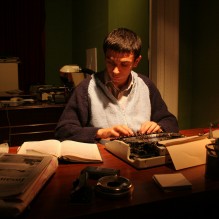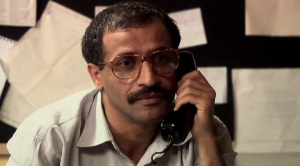
Journalism in Turkey has never been a job for the faint-hearted. Numbers of assassinated or imprisoned journalists have long been at levels comparable to the countries with authoritarian regimes. As of the end of 2012, the number of journalists imprisoned all around the world reached a record high (232 journalists) and Turkey has more journalists in prison than any other country in the world.
Press sets the scene around a national newspaper’s Diyarbakir bureau in the early 90s. There is no one-on-one correspondence between the characters in the movie and real people but what we see on the screen is substantially inspired by true events and real-life characters. The script’s starting point is Bayram Balci’s, a Kurdish journalist’s, personal notes from his days working for Ozgur Gundem in the Turkish East around the same years. Ozgur Gundem was no ordinary daily. It is the single most sued newspaper in Turkish press history, unique with its truly independent- natured (of government influence) reporting. And those were no ordinary times. Armed Kurdish conflict was at its peak in the first half of 90s. Number of civilians murdered by unknown assailants was on the rise in the southeast.
This debut feature is packed with a good number of incidents in its hardly above average run-time. Sedat Yilmaz seems to have achieved to make a movie that flows smoothly, connecting all these numerous pieces together. What he received from Balci was only a collection of stories which barely relate to each other, aside from all having something to do with journalists working in the region. Despite its minor flaws in dialogues and editing, the solid effort put into the text behind the movie is prominent. Luckily this first time filmmaker has even got more to offer besides his script-writing trades. Even for those unfamiliar with that particular chapter of Turkey’s turbulent history, the story flow and the atmosphere he creates around the characters should feel engaging. His shoestring budget does not seem to hinder him all that much. Indoor scenes balance well with powerful shot-on-location outdoor scenes. Recreation of Diyarbakir in the 90s, one of the biggest cities of Eastern Turkey and a cluster of tension during the heightened armed conflict between Kurdish guerrillas and Turkish army, is convincing and ambient. The deserted streets patrolled by the police tanks, the abandoned constructions at the city’s outskirts suitable for random interrogations, the dark narrow alleys where the chase between hit-men and their target often end, all these visions of a city of fear make you gulp.
With so many happenings in its little over 110 minutes, at times, the seven main characters in the newspaper bureau around whom the stories are revolving, appear thin on the screen. Their dialogues occasionally tend to fall into dullness. Fortunately enough, the overall atmosphere and the intriguing plot line save them from falling flat. One character who emerges with all its depth is the teenage, handyman-turned-journalist Firat. It is mostly due to the script’s clear focus on this character, giving him the most screen time, yet young actor, Aram Dildar deserves a lot of credit here, as well. His performance is simply outstanding.
This is a highly impressive debut from a promising director. Sedat Yilmaz manages to deliver an engaging political thriller, a political thriller with a heart and proves he has it, on all departments of auteur cinema. It would be nothing but wise to put him at the top ranks of our watch-list.


